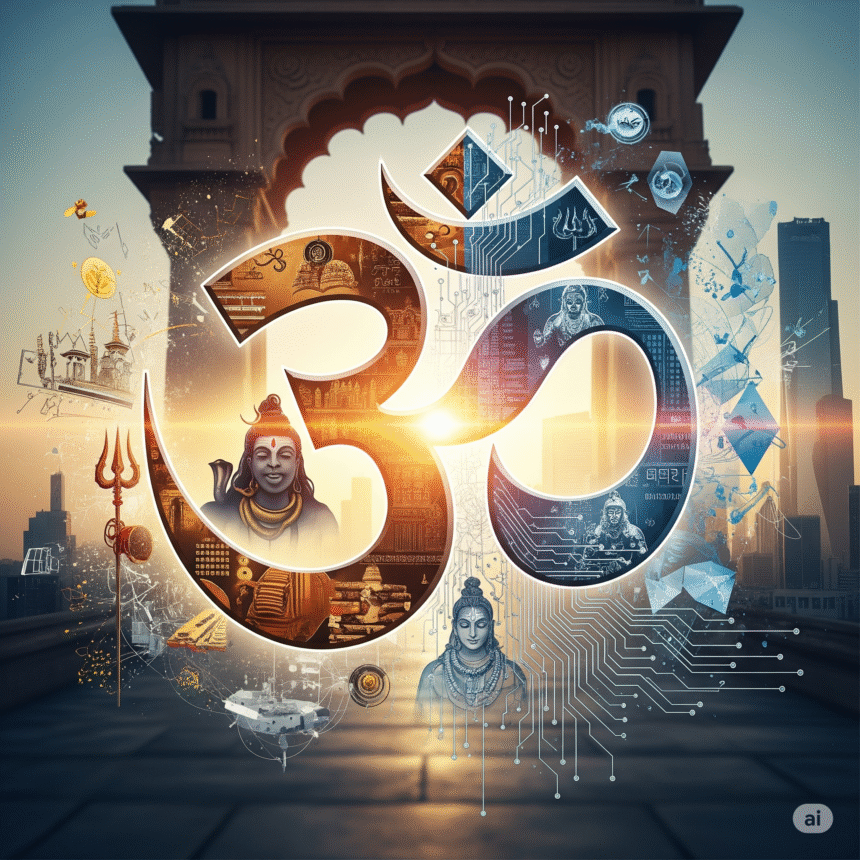Liberty and Advaita Vedanta: A Timeless Framework for Evolving Societies
Hindu philosophy, rooted in millennia of spiritual and intellectual traditions, is uniquely equipped to navigate the challenges of modernity. Unlike rigid dogmas, it thrives on adaptability, offering a framework that respects liberty, embraces diversity, and evolves with time. Central to this adaptability is the concept of Advaita Vedanta, or non-dualism, which underscores the unity of all existence and the boundless potential for individual and collective growth.
As the world grapples with the complexities of rapid change, Hindu philosophy stands as a testament to the power of flexibility and inclusivity, providing timeless guidance for navigating life’s challenges while embracing freedom and progress.
1. Advaita Vedanta: Unity in Diversity
- Core Philosophy: Advaita Vedanta, championed by Adi Shankaracharya, teaches that all beings are manifestations of the same ultimate reality (Brahman). This non-dualistic view emphasizes interconnectedness, transcending divisions of caste, creed, and nationality.
- Modern Relevance: In a polarized world, this philosophy offers a path to unity and harmony. By recognizing the divine within all, Advaita Vedanta fosters inclusivity and respect for diversity.
- Recent Spotlight: The 2023 World Philosophy Congress in Singapore celebrated Advaita Vedanta as a universal framework for promoting peace and coexistence in an increasingly fragmented global society.
2. Embracing Liberty: Hinduism’s Pluralistic Approach
- Freedom of Belief: Hinduism is inherently pluralistic, acknowledging multiple paths to the divine. This liberty allows individuals to choose their spiritual practices, reflecting their unique aspirations and needs.
- Advaita’s Role: By emphasizing the oneness of all existence, Advaita Vedanta encourages spiritual exploration and freedom, rejecting the need for conformity to a single doctrine.
- Modern Adaptation: Hindu festivals and rituals are increasingly personalized, with younger generations blending traditional practices with contemporary expressions of spirituality, such as mindfulness and environmental activism.
3. The Concept of Change in Hindu Philosophy
- Impermanence and Adaptability: Hindu texts like the Bhagavad Gita highlight the impermanence of the material world, encouraging individuals to adapt to change while staying rooted in eternal values.
- Application Today: This adaptability is evident in the modern embrace of eco-friendly rituals, digital pujas, and sustainable festival practices, ensuring traditions remain relevant without compromising their essence.
- Current Example: In 2023, cities like Bengaluru and Pune saw a 30% rise in eco-conscious Ganesh Chaturthi celebrations, aligning with Hinduism’s principle of living in harmony with nature.
4. Individual Freedom and Self-Realization
- Atman and Liberation: Advaita Vedanta teaches that the ultimate goal of life is self-realization, or recognizing the oneness of the self (atman) with the universal spirit (Brahman). This pursuit inherently champions individual liberty and inner exploration.
- Contemporary Practice: Meditation, yoga, and mindfulness practices derived from Vedantic teachings are now mainstream tools for personal growth and mental well-being.
- Global Reach: The 2023 International Yoga Day saw participation from over 190 countries, highlighting the universal appeal of Hinduism’s focus on self-realization and personal freedom.
5. Ethics and Morality in Modern Contexts
- Dharma in Action: Hindu philosophy’s emphasis on dharma (righteous action) provides a flexible moral framework that evolves with societal needs.
- Liberty with Responsibility: While Advaita Vedanta champions individual freedom, it also underscores the importance of acting in alignment with universal harmony, ensuring liberty does not lead to chaos.
- Practical Examples: Initiatives like the Seva for All program in 2023 embody this balance, encouraging selfless service while respecting individual autonomy.
6. Advancing with Technology
- Digital Dharma: Hindu philosophy’s adaptability extends to technology, with temples and spiritual organizations leveraging digital platforms to reach global audiences.
- Virtual Spirituality: Apps like E-Puja and Bharat Gyan Portal offer virtual darshans, online classes, and access to ancient texts, democratizing spiritual learning.
- Recent Milestone: The 2023 launch of the Global Vedantic Knowledge Hub provided free access to Advaita Vedanta teachings, attracting over one million users in its first month.
7. A Global Philosophy for Modern Humanity
- Universal Appeal: Advaita Vedanta’s message of unity and liberty resonates beyond India, influencing global spiritual movements and interfaith dialogues.
- Recognition on the World Stage: At the 2023 World Interfaith Summit, Hindu leaders emphasized Advaita Vedanta’s potential to bridge divides and foster collective progress.
Conclusion: The Timeless Relevance of Hindu Philosophy
Hindu philosophy, particularly through Advaita Vedanta, exemplifies the power of embracing change without losing sight of eternal truths. Its emphasis on unity, liberty, and adaptability makes it a guiding light for navigating modern complexities while fostering a sense of global harmony.
In a rapidly evolving world, Hinduism’s pluralistic and inclusive approach reminds us that progress and tradition need not be at odds. By blending ancient wisdom with contemporary needs, we can embrace change while staying connected to the essence of who we are—free, interconnected, and ever-evolving beings.


Leave a Reply